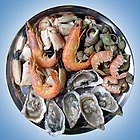– Hover over image and scroll to middle for controls to see more selected panorama images –
Introduction
| Earth's ocean |
|---|
|
Main five oceans division: Further subdivision: Marginal seas |

The ocean is the body of salt water that covers ~70.8% of the Earth. In English, the term ocean also refers to any of the large bodies of water into which the world ocean is conventionally divided. Distinct names are used to identify five different areas of the ocean: Pacific, Atlantic, Indian, Antarctic/Southern, and Arctic. The ocean contains 97% of Earth's water and is the primary component of the Earth's hydrosphere, thus the ocean is essential to life on Earth. The ocean influences climate and weather patterns, the carbon cycle, and the water cycle by acting as a huge heat reservoir. ( Full article...)

A sea is a large body of salty water. There are particular seas and the sea. The sea commonly refers to the ocean, the wider body of seawater. Particular seas are either marginal seas, second-order sections of the oceanic sea (e.g. the Mediterranean Sea), or certain large, nearly landlocked bodies of water. ( Full article...)
Oceanography (from Ancient Greek ὠκεανός (ōkeanós) ' ocean', and γραφή (graphḗ) ' writing'), also known as oceanology, sea science, ocean science, and marine science, is the scientific study of the oceans. It is an Earth science, which covers a wide range of topics, including ecosystem dynamics; ocean currents, waves, and geophysical fluid dynamics; plate tectonics and seabed geology; and fluxes of various chemical substances and physical properties within the ocean and across its boundaries. These diverse topics reflect multiple disciplines that oceanographers utilize to glean further knowledge of the world ocean, including astronomy, biology, chemistry, geography, geology, hydrology, meteorology and physics. Paleoceanography studies the history of the oceans in the geologic past. An oceanographer is a person who studies many matters concerned with oceans, including marine geology, physics, chemistry, and biology. ( Full article...)
Selected article -

Ocean deoxygenation is the reduction of the oxygen content in different parts of the ocean due to human activities. There are two areas where this occurs. Firstly, it occurs in coastal zones where eutrophication has driven some quite rapid (in a few decades) declines in oxygen to very low levels. This type of ocean deoxygenation is also called dead zones. Secondly, ocean deoxygenation occurs also in the open ocean. In that part of the ocean, there is nowadays an ongoing reduction in oxygen levels. As a result, the naturally occurring low oxygen areas (so called oxygen minimum zones (OMZs)) are now expanding slowly. This expansion is happening as a consequence of human caused climate change. The resulting decrease in oxygen content of the oceans poses a threat to marine life, as well as to people who depend on marine life for nutrition or livelihood. A decrease in ocean oxygen levels affects how productive the ocean is, how nutrients and carbon move around, and how marine habitats function.
As the oceans become warmer this increases the loss of oxygen in the oceans. This is because the warmer temperatures increase ocean stratification. The reason for this lies in the multiple connections between density and solubility effects that result from warming. As a side effect, the availability of nutrients for marine life is reduced, therefore adding further stress to marine organisms. ( Full article...)Interesting facts -
- In 1989, the colonial coral Astroides calycularis expanded its range to the Adriatic Sea after previously being restricted to an area west of Sicily.
- San Diego physician Fred Baker was a co-founder of the Scripps Institution of Oceanography and the San Diego Zoo.
- The sea hedgehog is a cannibal.
Selected list articles and Marine habitat topics
| Marine habitats |
|---|
| Coastal habitats |
| Ocean surface |
| Open ocean |
| Sea floor |
- List of oceans
- List of ancient oceans
- List of seas
- List of circumnavigations
- List of cruise lines
- List of largest lakes and seas in the Solar System
- List of marine biologists
- List of marine ecoregions
- List of maritime explorers
- List of naval battles
- List of ocean liners
- List of oceanographic institutions and programs
- List of oldest surviving ships
- List of rogue waves
- List of seafood dishes
- List of submarine topographical features
Tasks
General images -
Related portals
In the news
- 12 April 2024 – Iran–Israel proxy conflict
- Germany tells its citizens to leave Iran immediately, saying that "air, land and sea transport routes" will likely be affected by military action in the region. (Reuters)
- 8 April 2024 – Russian invasion of Ukraine
- Ukraine claims to have damaged the Russian Navy missile ship Serpukhov in the Baltic Sea near Kaliningrad. (Kyiv Independent)
- 1 April 2024 –
- North Korea fires a ballistic missile into the Sea of Japan near South Korean territory. (AP)
- 31 March 2024 – Visa policy of the Schengen Area
- Bulgaria and Romania partially join the Schengen Area, allowing travel by air and sea without border checks, Austria vetoed travel by land without border checks over fears that non- EU citizens could get easier access to the European Union. (France 24)
- 28 March 2024 – 2023–24 South-West Indian Ocean cyclone season
- Cyclone Gamane makes landfall in Madagascar, killing at least eleven people and causing widespread flooding, according to local officials. (AP)
WikiProjects
Topics
Categories
Associated Wikimedia
The following Wikimedia Foundation sister projects provide more on this subject:
-
Commons
Free media repository -
Wikibooks
Free textbooks and manuals -
Wikidata
Free knowledge base -
Wikinews
Free-content news -
Wikiquote
Collection of quotations -
Wikisource
Free-content library -
Wikiversity
Free learning tools -
Wiktionary
Dictionary and thesaurus
Admiralty law
| Admiralty law |
|---|
|
|
| History |
| Features |
| Contract of carriage/ Charterparty |
| Parties |
| Judiciaries |
| International conventions |
| International organizations |
Need assistance?

Do you have a question about oceans, seas or oceanography that you can't find the answer to? Consider asking it at the Wikipedia reference desk.
External media

- World Ocean Database and World Ocean Atlas Series – from the U.S. National Centers for Environmental Information, National Oceanic and Atmospheric Administration. Includes the World Ocean Atlas.
- European Atlas of the Seas – the European Atlas of the Seas, from the European Commission
- NOAA Research – NOAA research news, Oceanic and Atmospheric Research (OAR)
- Ocean Research – from The World Ocean Observatory
- Ocean Biodiversity Information System – "a global open-access data and information clearing-house on marine biodiversity for science, conservation and sustainable development"








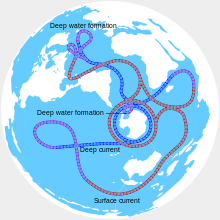



























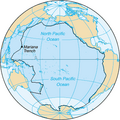




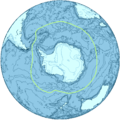













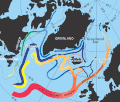


















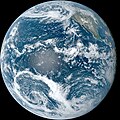




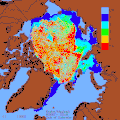







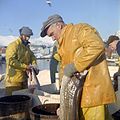












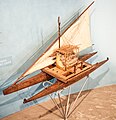




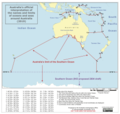








![Image 108"Terres Australes" [sic] label without any charted landmass (from Southern Ocean)](https://upload.wikimedia.org/wikipedia/commons/thumb/8/8e/Geography_world_map.jpeg/120px-Geography_world_map.jpeg)







